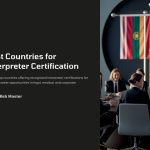 As global communication becomes more essential, the demand for skilled interpreters is booming across borders. From international diplomacy to global commerce, interpreters play a pivotal role in connecting cultures and enabling business success. Preparing for a career abroad as an interpreter is not just about language fluency—it involves building credibility, acquiring the right certifications, understanding international work culture, and positioning yourself for long-term success. In this guide, we’ll break down the critical steps to turn your interpreting skills into a rewarding international career.
As global communication becomes more essential, the demand for skilled interpreters is booming across borders. From international diplomacy to global commerce, interpreters play a pivotal role in connecting cultures and enabling business success. Preparing for a career abroad as an interpreter is not just about language fluency—it involves building credibility, acquiring the right certifications, understanding international work culture, and positioning yourself for long-term success. In this guide, we’ll break down the critical steps to turn your interpreting skills into a rewarding international career.

Understanding the Global Demand for Interpreters
In recent years, there has been a notable increase in demand for interpreters in regions like Southeast Asia, Europe, and the Middle East. This surge is driven by expanding multinational operations, cross-border healthcare services, legal arbitration needs, and government-level diplomacy. Companies and governments are actively recruiting interpreters who can bridge linguistic and cultural gaps with precision and professionalism.
For example, industries such as tourism, IT, and medical services are frequently in need of interpreters for remote work or relocation. The rise of virtual interpretation platforms has also broadened the scope for international work, making it easier to be hired from anywhere in the world.

Essential Qualifications and Certifications You Need
To work internationally, interpreters often need recognized certifications that validate their expertise. One of the most globally accepted credentials is the CI (Conference Interpreter) accreditation from AIIC or certification from national bodies like the ATA (American Translators Association), NAATI (Australia), or the CIOL (UK).
Fluency alone won’t secure you a job. Clients and agencies seek professionals with proven skills in real-time interpreting, subject-matter knowledge, and ethical conduct. In addition, proficiency in specialized fields such as legal, medical, or technical interpreting significantly boosts job prospects and earning potential.

Building an International Interpreter Portfolio
A compelling portfolio is a key to unlocking international jobs. This should include not only your certifications and resume but also real-world samples of your interpretation work, client testimonials, and possibly even recordings. Many interpreters now build online portfolios to make themselves more accessible to potential employers.
Include detailed case studies of past interpretation assignments, especially those involving high-pressure or multilingual environments. Demonstrating your ability to adapt and manage cross-cultural communication can strongly influence hiring decisions.

How to Find and Apply for Interpreter Jobs Abroad
Start by identifying international job platforms like ProZ, TranslatorsCafe, and even LinkedIn where many agencies post listings for interpreters. It’s important to tailor each application with a customized cover letter, highlighting your international readiness, cultural adaptability, and specific skills.
Also, consider applying to global organizations like the UN, WHO, or international NGOs which constantly seek professional interpreters. Your resume should clearly indicate your language pairs, years of experience, fields of specialization, and any availability for relocation or remote assignments.

Navigating Work Visas and Legal Requirements
Visa requirements differ by country and job type. Some countries offer specific work visas for language professionals, while others may require you to go through sponsorship or freelance visa routes. Understanding visa regulations in countries like Canada, Germany, and Australia can help you strategically plan your job search.
Always verify the most recent visa policies through the official immigration websites. Being proactive in collecting required documents—such as invitation letters, proof of contracts, and qualification certificates—will save valuable time in the application process.

Maximizing Your Career Growth and Earnings Overseas
Once you secure a job abroad, focus on continuous development. Attend international interpreter conferences, engage in cross-cultural training, and seek mentorship from experienced professionals. These practices not only refine your skills but also expand your global network.
To increase your earnings, negotiate contracts effectively and consider diversifying income through remote interpretation, voiceover projects, or translation work. Many successful interpreters also offer private coaching, webinars, or multilingual event support to broaden their income streams.
*Capturing unauthorized images is prohibited*




